The confessions of the deadly sins are followed by a resolve that the whole company should go on a pilgrimage to find Truth. As nobody knows where to search, they blunder around all day before finding a vastly experienced pilgrim whose mementos and trophies declare that he has been almost everywhere. Asked for directions to find Truth
"'Not me, never met him', the man riposted.
No pilgrim or palmer with pikestaff and bundle
Has ever asked me for anyone like him."
This is a typical Langland expression of his opinion. Piers give his own directions for finding Truth by giving the names of moral virtues to geographical features. Then Piers is mentioned for the first time. in the role of a simple agricultural worker. He knows Truth as his employer: an honest person who rewards him fairly for his work. Piers is asked to lead the company on pilgrimage and makes a long speech about the spiritual behaviour needed by a pilgrim and about entry into heaven. It is full of 'mini-allegories' and does not move the story on. But each of those allegories is thoughtful and stands up.
Piers will lead the pilgrimage, but only after he has done his proper work, which is to till a half-acre. This will delay the start, and some of the women in the company want to know how they should fill in the waiting time.
"And you, lovely ladies, with your long fingers,
Take silk and sendal to sew when you've time
Chasubles for chaplains for the church's honour."
Also in the company is a knight who says that he is perfectly willing to help but knows nothing about ploughing. He is told that his duty is to protect society, for which work he has been given special skills and privileges. He must not allow his status to give him great ideas, for in;
"charnelhouse at church, churls are hard to distinguish,
Or a knight from a knave: know this in your heart."
The project is hindered by idle workmen who are discovered drinking and singing when the supervisor (Piers) walks round. The remedy is to call up Hunger, who motivates the shirkers.
"Blind men and bedridden invalids by the thousand
suddenly got better, and people who had sat about
begging for money underwent immediate recoveries."
Piers asks Hunger to suggest how he himself can persuade folk to work hard. The answer becomes a long Langland moan about idleness, and drifts into the debilitating effects of eating and drinking too much, or unhealthy things. That in turn gives him the opportunity for a blast at doctors who enrich themselves. If people looked after their bodies, Langland feels,
"That Sir Physic will have to forfeit his fur
And his gold-tasselled cloak for a good bowl ot gruel.
And will find himself forced to abandon his profession
And to learn to live from work on the land.
For deceitful physicians are assassins, God help them!
Folk die from their drugs before destiny wills it."
But Hunger then refuses to go away. So the story morphs into a tale of the yearly cycle, with hard times when stock from last year is running out and good times when the new corn comes to market.
"Everyone cheered up, and started feeding Hunger with
nothing but the best; and taking a leaf out of Glutton's
book, they put him to sleep with a draught of strong ale."
The pilgrimage never starts. There is a message from Truth telling Piers to stay at home and get on with his ploughing,
"He had him hold himself at home and harrow his acre;
Truth also sent Piers a pardon. The church in those days issued various grades of pardon which forgave sin or saved the sinner from punishment. They made getting into heaven easier. Going on pilgrimage also facilitated entry, so it is not quite clear how this relates to Langland's desire to save his soul. Is he saying that a pardon makes going on pilgrimage unnecessary or is he denying the value of pilgrimage anyway? But the pardon certainly plays a major part in the search because it gets scrutinised by a priest - one who could actually read - who describes the pardon, saying;
",,,,,,there is no pardon in it,
But Do Well and have well, and God shall have thy soul,
And do evil and have evil, and you may hope only
That after your death day the devil shall take you."
The dreamer spends many lines of poetry debating the efficiency of qualifications that will get him into heaven: documents issued by the church authorities or a life lived righteously. He names the latter alternative as Do Well and the following sections of the poem are a search for Do Well as an allegorical character.
"But to trust to these triennials, truly I consider
Is not so safe for the soul, surely, as Do Well!"
"Thus robed in russet I roamed the country
All a summer season, seeking for Do Well."
WHICH WAY TO GO?

CHASUBLES FOR CHAPLAINS
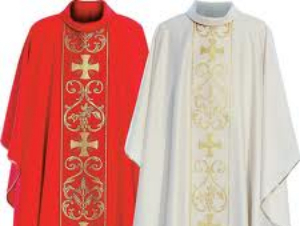
CHARNELHOUSE AT CHURCH
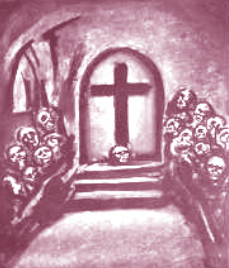
HUNGER ASLEEP AFTER DRAUGHT OF STRONG ALE
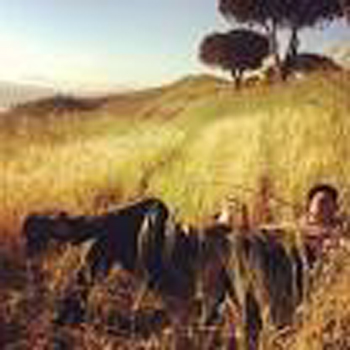
WHAT DOES IT MEAN?
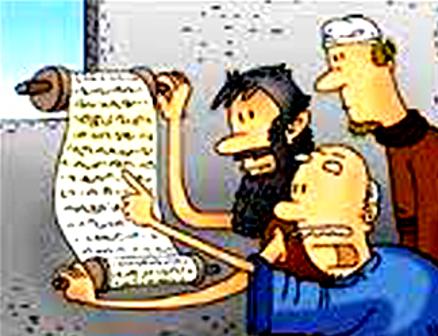
ALL A SUMMER SEASON
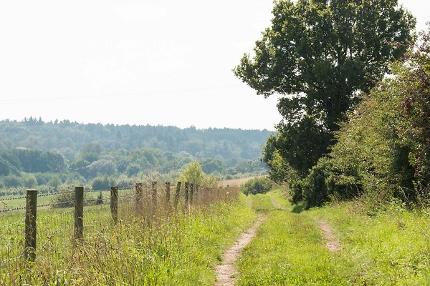
The search starts when the dreamers meets a pair of friars and finds them unsatisfactory. Then he meets THOUGHT. Go back to the beginning by clicking on HOME. Or click on THOUGHT-WIT-STUDY to progress.